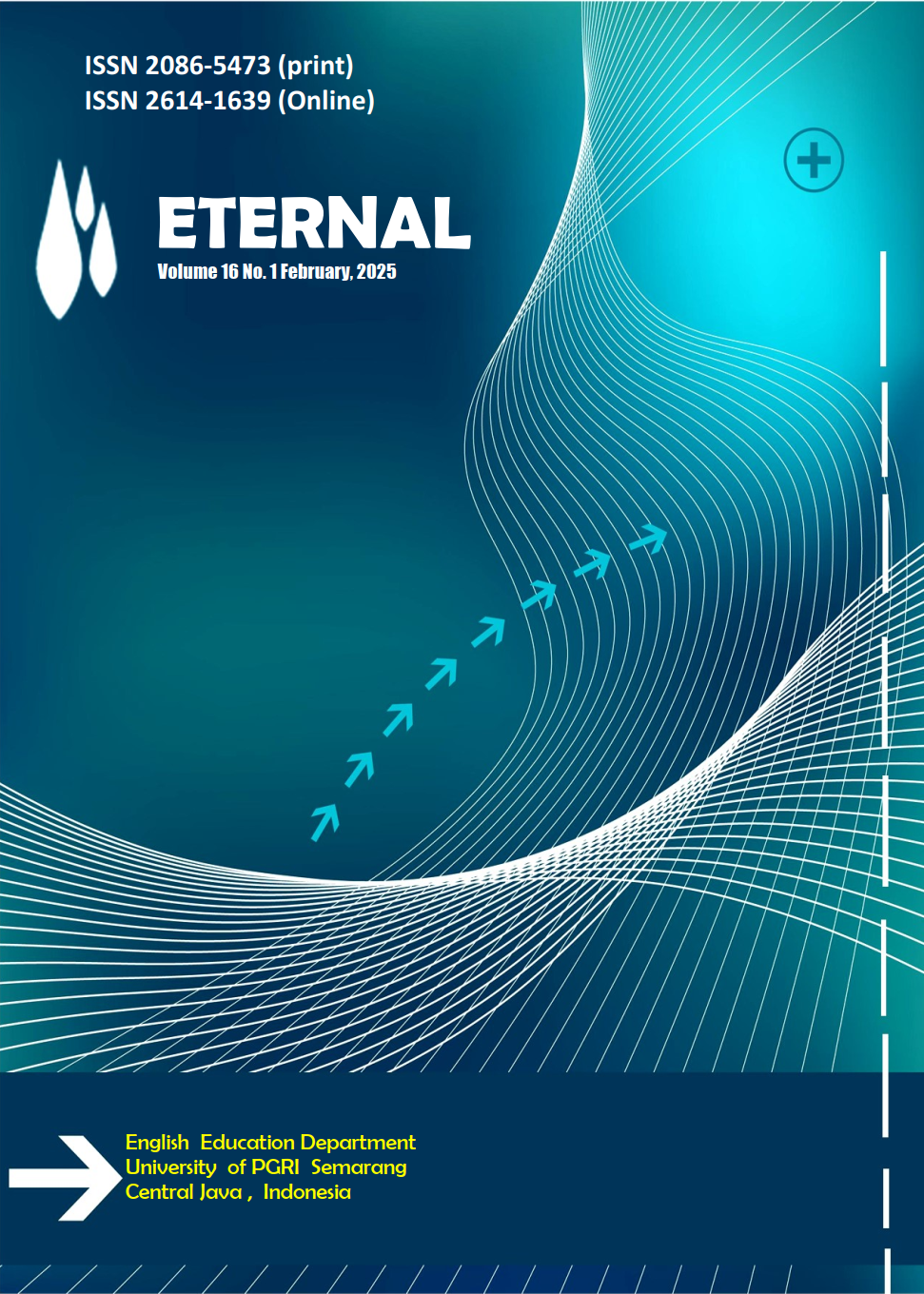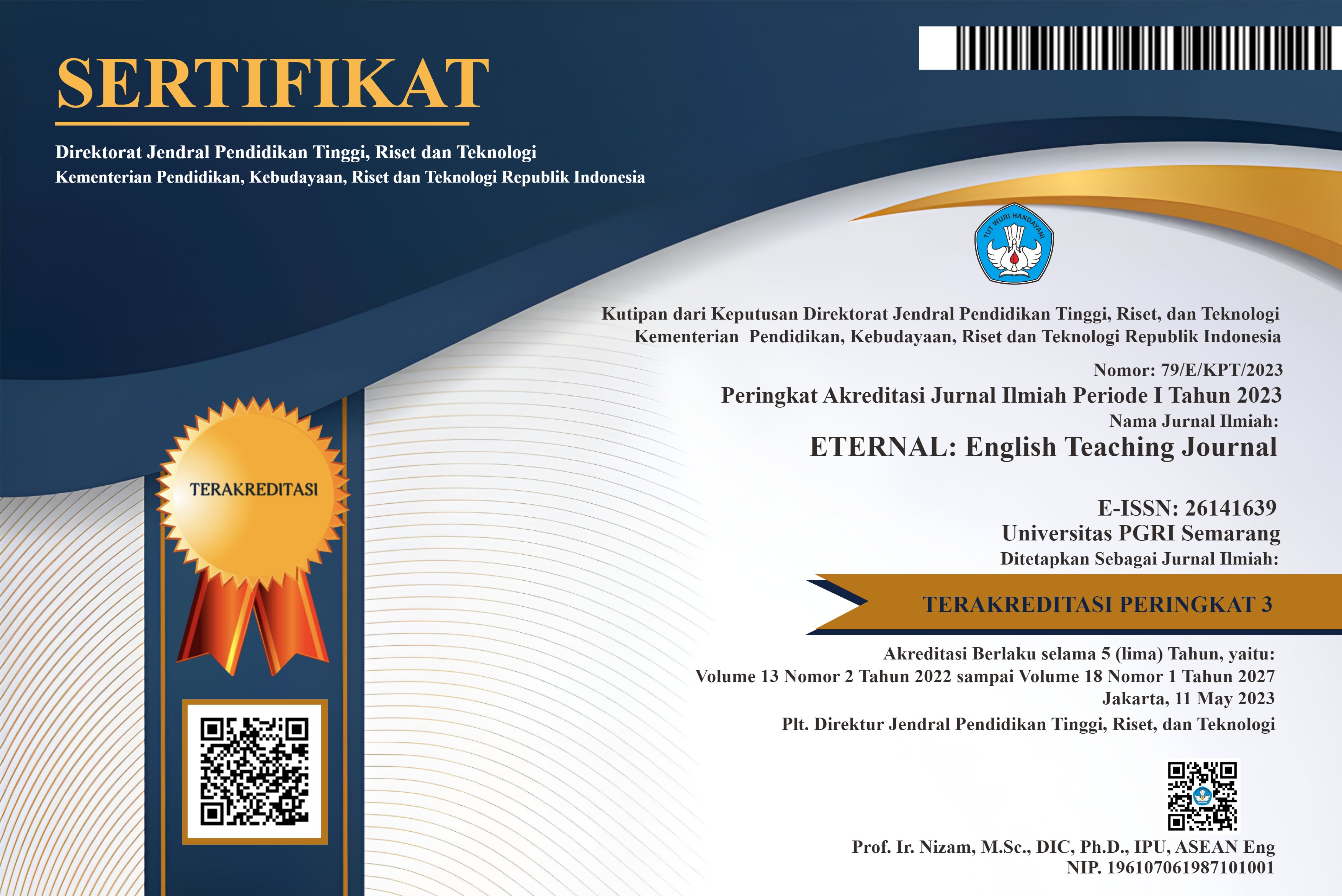Exploring Bilingual Education Program at Private Islamic Boarding School
DOI:
https://doi.org/10.26877/eternal.v16i2.2363Keywords:
Bilingual Program, Malhikdua School, Private Islamic Boarding School, Curriculum Design, Education ProgramAbstract
This case study aims to explore the process of curriculum design and development in bilingual program at private Islamic boarding school in Brebes The data were collected from stakeholders, English teachers, the members, and Self-Development Club, through direct observation, site visits, interviews, and document analysis. The data were analyzed qualitatively. There are three modifications of the curriculum supporting bilingual students' English improvements. They are implementing four years of study that the students will have a matriculation grade in the first year; adding English school hours in each grade, and providing English supporting programs named School Outing Program, Teaching Program, and Malhikdua Explore. Then, the existence of students' bilingual organization called Self-Development Club significantly contributes by taking over students' language improvement activities besides school hours. After being facilitated with the programs mentioned, the student's English proficiency was assessed through TOEFL by a certified state university language center and LPKS by the Brebes Department of Employment, with average scores of 510 (TOEFL) and 83% Grade A (LPKS). As a result, bilingual program of MA Al Hikmah 2 has successfully designed a proper curriculum to enhance students’ English proficiency.
References
Amri, M., Tahir, S. Z. A. B., & Ahmad, S. (2017). The implementation of Islamic teaching in multiculturalism society: A case study at pesantren schools in Indonesia. Asian Social Science, 13(6), 125. https://doi.org/10.5539/ass.v13n6p125
Baker, C. (2011). Foundations of bilingual education and bilingualism. Multilingual matters.
Ball, P. 2006. Defining CLIL parameters. Retrieved from http://www.onestopenglish.com/clil/methodology/articles/ June 2024.
Bialystok, E., Peets, K. F., & Moreno, S. (2014). Producing bilinguals through immersion education: Development of metalinguistic awareness. Applied Psycholinguistics,35 (1), 177-191. https://doi.org/10.1017/S0142716412000288
Canagarajah, A. S. (2007). Lingua franca English, bilingual communities, and language acquisition. Modern Language Journal, 91, 921–937. https://doi.org/10.1111/j.1540-4781.2007.00678.x
Cenoz, J., & Gorter, D. (2011). A holistic Approach to Bilingual Education: Introduction. The Modern Language Journal, 95, 339-343. https://doi.org/10.1111/j.1540-4781.2011.01204.x
Creswell, W. John. (2014). Research design, third edition. USA: Sage Publication, Inc.
Cummins, J. (1991). Language development and academic learning. In L. Malave & G. Duquette (Eds.), Language, culture and cognition. Clevedon, UK: Bilingual Matters.
Fakhrudin, M. U., Padmajati, A., & Pranata, S. (2024). Improving Listening Comprehension Learning of the Seventh Grade Students through Digital Storytelling. JELLT (Journal of English Language and Language Teaching), 8(1), 40-57. https://doi.org/10.36597/jellt.v8i1.15746
Fakhrudin, M. U., Suwandi, S., Septian, W. E., & Ramadhani, A. (2024). Modern Islamic Boarding School English Teachers’ Workload and Their Performance: A Phenomenological Analysis. Journal of Literature Language and Academic Studies, 3(02), 68-74. https://doi.org/10.56855/jllans.v3i02.1172
García, O. (2011). Bilingual education in the 21st century: A global perspective. John Wiley & Sons.
Jayanti, D., & Sujarwo, A. (2019). Bilingual education in Indonesia: between idealism and the reality. Script Journal: Journal of Linguistic and English Teaching, 4(1), 12. https://doi.org/10.24903/sj.v4i1.271
Kramsch, C. (2006). The multilingual subject. International journal of applied linguistics, 16(1), 97-110. https://doi.org/10.1111/j.1473-4192.2006.00109.x
Margana. (2015). Establishing English-Indonesian in Indonesia: From Theory to Practice. RA Journal of Applied Research, 1(10), 365-374. https://www.rajournals.in/index.php/rajar/article/view/320
Ricento, T. (2013). The consequences of official bilingualism on the status and perception of non-official languages in Canada .Journal of Bilingual& Multicultural Development, 34(5), 475-489. https://doi.org/10.1080/01434632.2013.783034







